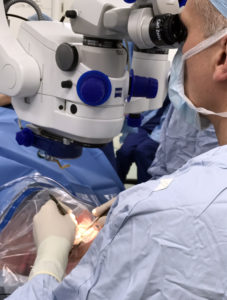
Researchers have started a new gene therapy clinical trial to treat X-linked retinitis pigmentosa (XLRP), the most common cause of blindness in young people. Retinitis pigmentosa is currently untreatable and leads to a slow and irreversible loss of vision.
On 16 March 2017, a 29-year-old British man became the first patient with X-linked retinitis pigmentosa to undergo gene therapy. The operation was carried out by doctors at the Oxford Eye Hospital, part of the Oxford University Hospitals NHS Foundation Trust.
Gene therapy uses a virus to insert the correct copy of a defective gene into cells, and has shown promise for treating genetic causes of blindness. Unfortunately, the gene involved with retinitis pigmentosa, RPGR, is highly unstable, making gene therapy particularly challenging. The RPGR gene’s unusual genetic code has made it very difficult to work with in the laboratory.
However, a research team led by Professor Robert MacLaren from the University of Oxford has reprogrammed the genetic code of RPGR to make it more stable, but in a way that does not affect its function. This has allowed the gene to be delivered reliably by a viral vector into retinal cells.
The current trial is the first in the world to test a treatment for retinitis pigmentosa caused by RPGR. Up to 30 patients will be enrolled on the trial at the Oxford University Hospitals NHS Foundation Trust. The trial is supported by the NIHR Oxford Biomedical Research Centre, a partnership between the Trust and the University of Oxford, funded by the National Institute for Health Research (NIHR).
Robert MacLaren, Professor of Ophthalmology at the University of Oxford, who is leading the trial said: “The effect of RPGR-related disease on families with retinitis pigmentosa is devastating and we have spent many years working out how to develop this gene therapy. Changing the genetic code is always undertaken with great caution, but the new sequence we are using has proven to be highly effective in our laboratory studies.
“The genetic code for all life on earth is made up of four letters – G, T, A and C. In RPGR, however, half of the gene comprises only two letters – A and G. This makes the gene very unstable and prone to mutations, making it a lead cause of blindness in patients with retinitis pigmentosa. RPGR is vital for the light sensitive cells at the back of the eye.”
Philip Herd, a 39 year old Client Manager working in the Software industry from Marlow, Buckinghamshire who has X-linked retinitis pigmentosa is delighted to hear that a gene therapy trial has now started.
Mr Herd is not taking part in this particular clinical trial, but he said: “I am delighted that gene therapy may be able to help other people with this disease. I first noticed my sight deteriorating when I was 32 and it was diagnosed as retinitis pigmentosa. I can manage by the use of technology such as a smart phone and by maintaining a sense of humour. The little things that most people take for granted I find restricted however I am constantly adapting the way I tackle this condition.”
The trial is being run by Nightstarx Ltd (Nightstar), a University of Oxford biopharmaceutical spinout company developing gene therapies for inherited retinal diseases, and researchers from the University of Oxford.
David Fellows, Chief Executive Officer of Nightstar remarked, “We are delighted to report the advancement of this exciting gene therapy program into patients. If successful, this gene therapy has the potential to transform the lives of many patients (and their families) around the world.”
Dr Aniz Girach, Chief Medical Officer of Nightstar commented, “The current trial is an open-label dose-escalation study designed to enrol at least 24 patients who will receive a single subretinal injection of the RPGR gene therapy. The primary goal of the study is to assess safety and tolerability of this gene therapy over a 12 month period.”